
Not only are non-custodial cryptocurrency wallets considered safer for storing crypto compared to their custodial counterparts, but they are also faster, cheaper, and usually much more flexible. However, with so many available on the market, it’s not easy to know which are worth investing with.
Anyone who’s looking for a handy tool to keep their precious digital assets safe and sound need look no further than this non-custodial wallet breakdown. We’ll be analyzing the speed, accessibility, price, and plenty of other additional features so that you know exactly what you’ll be getting when picking up one of these reliable non-custodial wallets.
Sponsored
Before discussing these devices’ more complex elements, it can be useful to establish a basic understanding of what these wallets are and how they function.
How Do Non-Custodial Crypto Wallets Work?
Just as the name implies, crypto wallets are apps, programs, and devices designed to store a person’s digital assets while also allowing them to buy, trade, and sell crypto at their own leisure. Users can then use their unique private key to sign off any transactions they would like to make with their own funds.
Non-custodial wallets don’t contain any intermediaries, granting the user complete control over their assets, so they will only need to verify a transaction to be processed. These types of wallets are considered extremely safe since it’s harder for hackers to receive personal information when it’s not part of a larger database. This is the exact opposite of custodial wallets, which rely on third parties to handle a person’s funds at the expense of the user losing a good portion of authority and control over their assets.
Sponsored
By far the biggest drawback of non-custodial wallets is the massive amount of responsibility placed on the user to not lose their private key or unique seed recovery phrase. If these are misplaced, the owner can be locked out of their funds entirely, so it’s worth considering this before deciding on one wallet over the other.
Best Non-Custodial Wallets
Non-custodial wallets have evolved extensively since they first debuted on the market, but not all are created equal. The ones below have proven to be among the most effective and reliable when storing and spending precious crypto assets. So, it’s time to see why they’ve earned such a reputation and if they’re something you might want to consider picking up yourself.
1. Zengo – A Hassle-Free Wallet With Secure MPC Technology
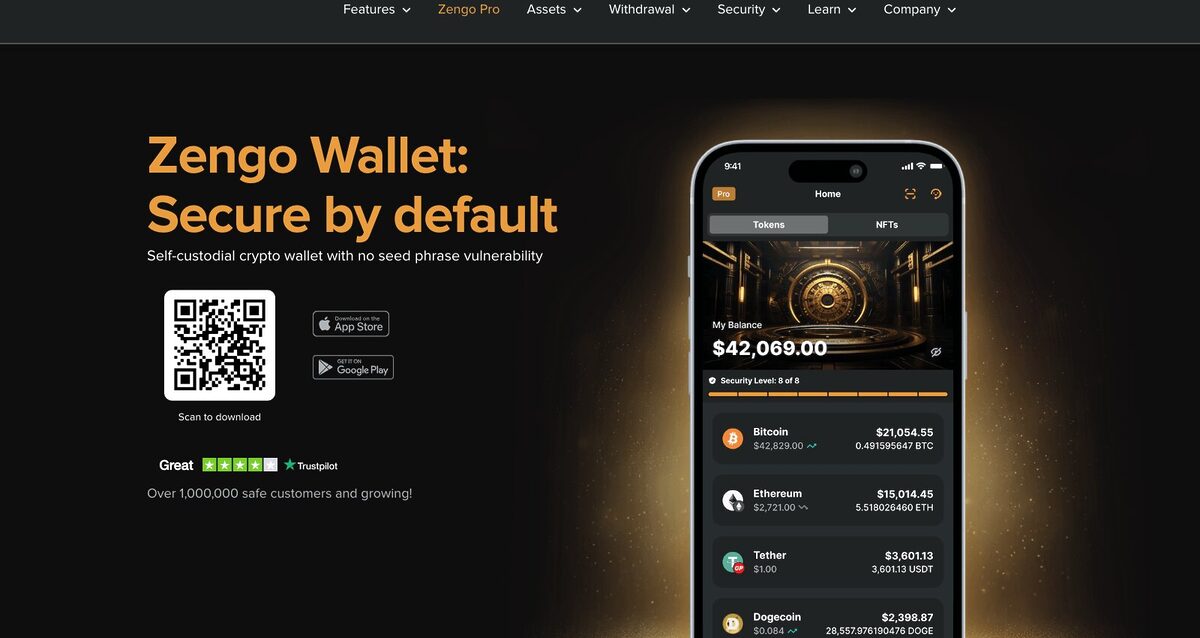
Zengo stands out for its built-in MPC (Multi-Party Computation) technology, which segments the users’ private information into different servers. This makes the wallet more or less impenetrable to hackers trying to obtain a private key.
Alongside this innovative security measure, Zengo offers a 24/7 customer support helpline to assist users with their crypto management. Zengo supports Bitcoin, Ethereum, Dogecoin, USDT, Chainlink, USDC, and many of the biggest cryptos, and it even allows for the storage of NFTs.
Though some valuable features, such as a Web3 firewall and legacy transfer, are hidden behind a paywall, Zengo’s ambitious tech and systems make it state-of-the-art when it comes to safeguarding your precious assets.
Pros:
- MIP security negates the need for a seed phrase.
- 24/7 user support helpline.
- NFT functionality.
Cons:
- Features locked behind a paywall.
- No support for Cardano, XRP, Solana or Polkadot.
2. Trezor – A Small Yet Durable Piece Of Cold Storage
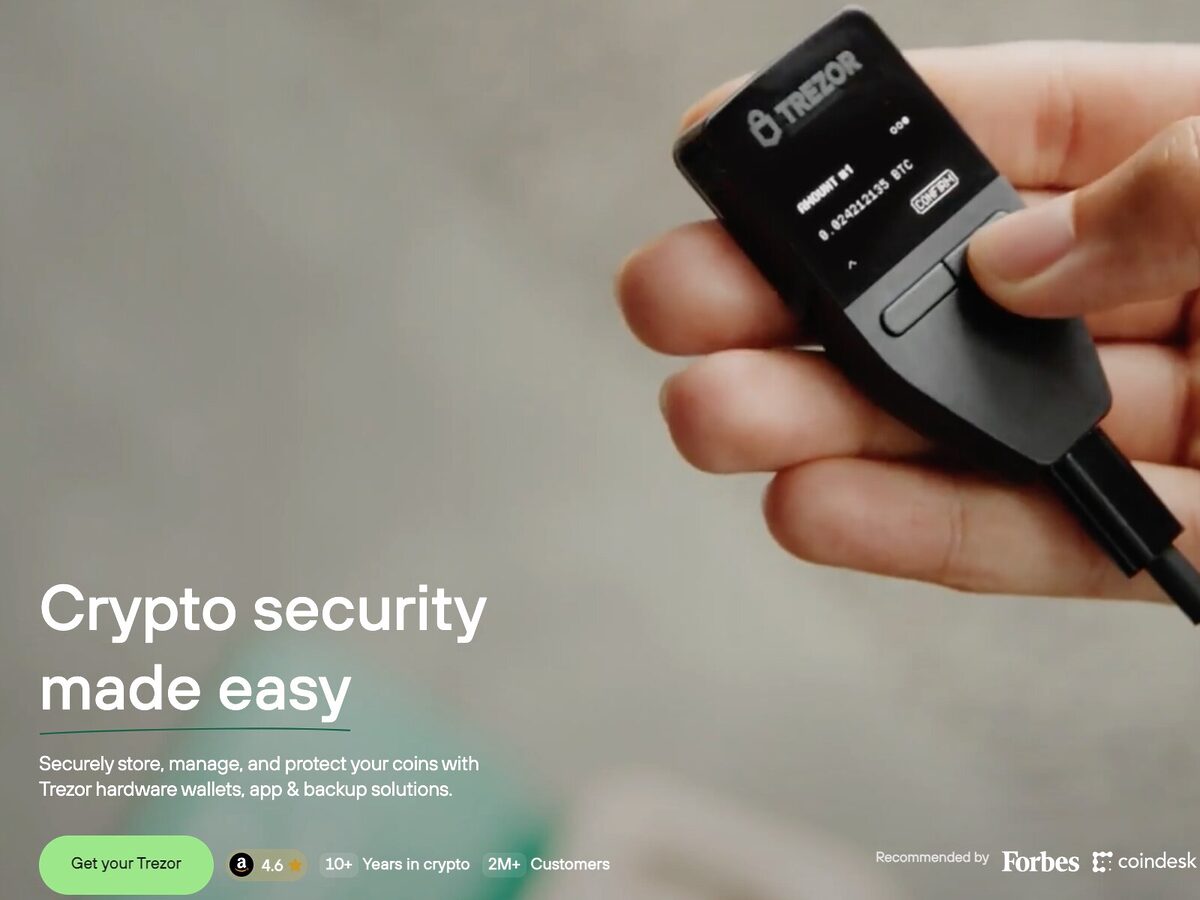
Rather than a browser extension or mobile app, Trezor is a physical hardware wallet that stores users’ funds and private keys when they are ready to use them. Its ability to function offline and its tangible nature protect Trezor from hacks and make it ideal for those who don’t always have access to a reliable internet connection.
Receiving and sending transactions with the click of a button makes Trezor wallets easy to use and navigate, even for those just starting in the crypto world.
Because everything is stored on one device, buying Trezor from a reliable seller is critical to ensure it hasn’t been tampered with. There is also an expensive $170 Trezor Model T version, which comes with extra features, including a touchscreen, a faster processor, and support for just under 200 extra tokens compared to the original model.
Pros:
- Cold wallet, which is extremely secure and usable offline.
- PIN up to 50 digits long for extra safety.
- Easy-to-use interface.
- Multiple device versions available.
Cons:
- User always needs to have their device on them to not miss out on fast trades.
- Just under 200 tokens restricted to the more expensive Model T.
Check out the Trezor Model One
Check out the Trezor Model T
3. Coinbase Wallet – A Flexible DeFi Mobile Wallet
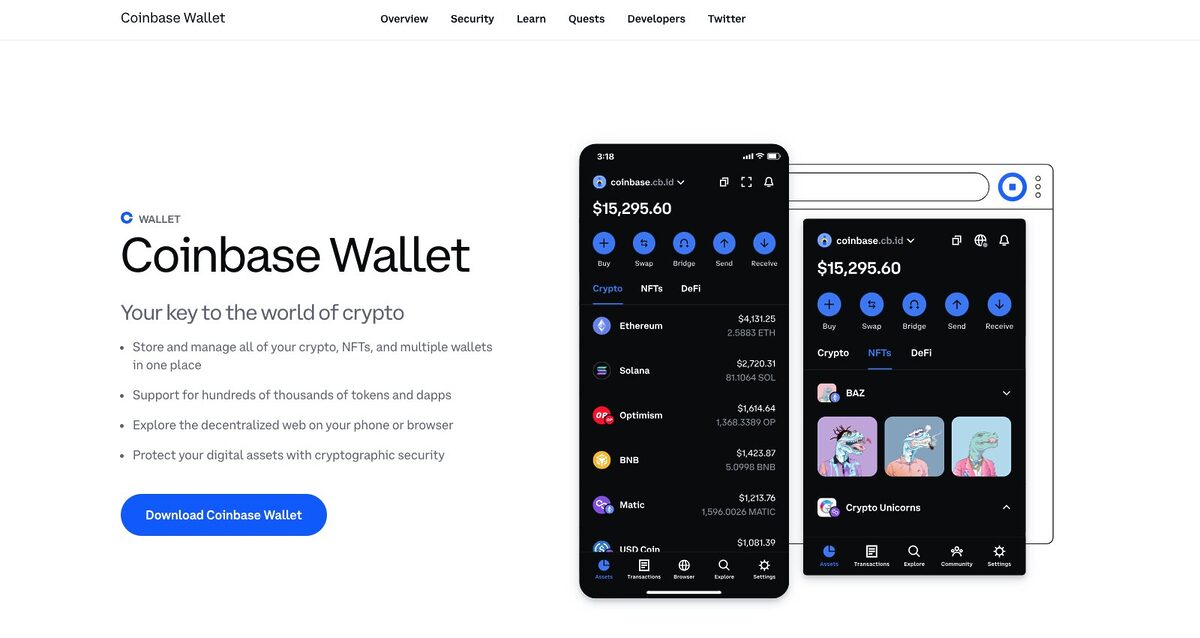
DeFi is essentially the crypto version of Wall Street, allowing users to lend, lock, and save currency depending on their investment plans. Coinbase users can connect to DeFi applications in order to swap tokens faster, access staking tools, and partake in the DEX (Decentralised Exchange) peer-to-peer marketplace.
Despite its size and prolific nature, Coinbase guarantees that users’ details will never be shared with the central exchange, giving owners full control over their funds and private keys.
Bitcoin, Solana, Ethereum, and plenty of other crypto can be handled through Coinbase, alongside some Layer 2 networks like Polygon and even NFTs. Coinbase wallets can currently only be downloaded on a mobile device, but adding dApps and the user-friendly interface helps to make up for this shortcoming.
Visit Coinbase
Pros:
- Provides full DeFi app support.
- Supports ETH, SOL cryptos, along with level 2 networks including Polygon.
- NFT functionality.
- Beginner-friendly interface.
Cons:
- Only available as a mobile wallet app.
4. MetaMask – A Free And Easy Ethereum-Blockchain Wallet
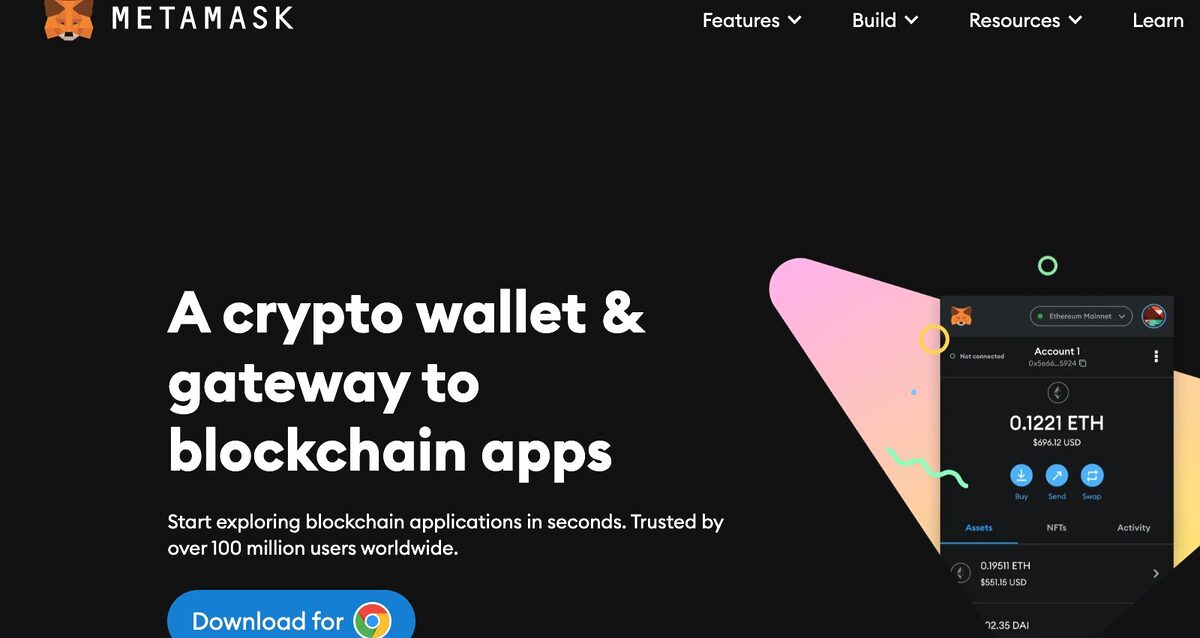
For a while, MetaMask was only available as a browser extension, but this free, fast, and reliable wallet can now also be downloaded on mobile devices. MetaMask doesn’t require any account or maintenance fees and is very secure thanks to the unique password and 12-word passcode safeguarding the private key.
This level of security has made MetaMask very popular among serious investors. Still, it does need to be mentioned that it’s first and foremost designed for trading tokens within the Ethereum blockchain. This means it fully supports most Ethereum-based blockchains, including OmiseGo, EOS, Qtum, and ICON, though it’s incompatible with the Bitcoin blockchain.
Visit MetaMask
Pros:
- Unique passwords and 12-word passcode provide excellent security.
- No account or maintenance fees.
- Available on mobile and web browsers.
Cons:
- Designed primarily for Ethereum-based blockchains.
- Specific non-Ethereum blockchains must be added manually.
5. Exodus – A Highly Diverse Alternative For Long-Term Investors
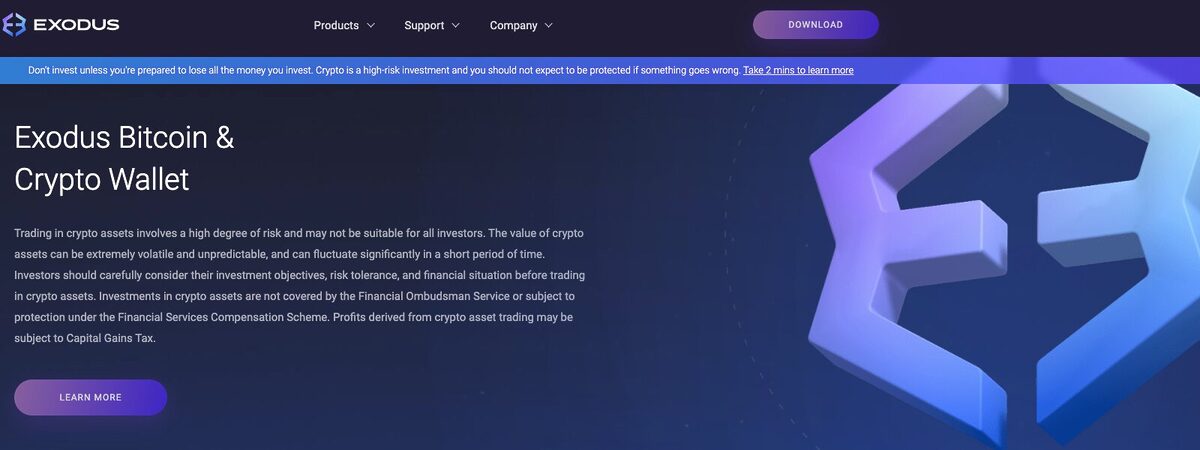
Exodus supports a staggering number of cryptocurrencies. From Bitcoin and Litecoin to XRP and Dogecoin, this variation is perfect for experienced crypto users who want to access multiple markets simultaneously.
Speaking of markets, Exodus features in-app exchanges, which are quite convenient. However, depending on the token, these do come with a small fee. Exodus is free to set up and functional across multiple devices at once.
Sadly, two-factor authentication isn’t included here, which can be a deal breaker for those who care about tight-knit security above all else. Instead, Exodus will store personal info on the user’s local devices, which is still safe. However, be sure to avoid any viruses since they can easily complicate things.
Visit Exodus
Pros:
- Supports a staggering amount of cryptocurrencies.
- Works across multiple devices.
- In-app trading allows users to respond to fluctuation rates quickly.
Cons:
- Fee for conducting in-app transactions.
- No two-factor authentication.
6. Trust Wallet – A Fully Decentralised Wallet With Web3 Functionality
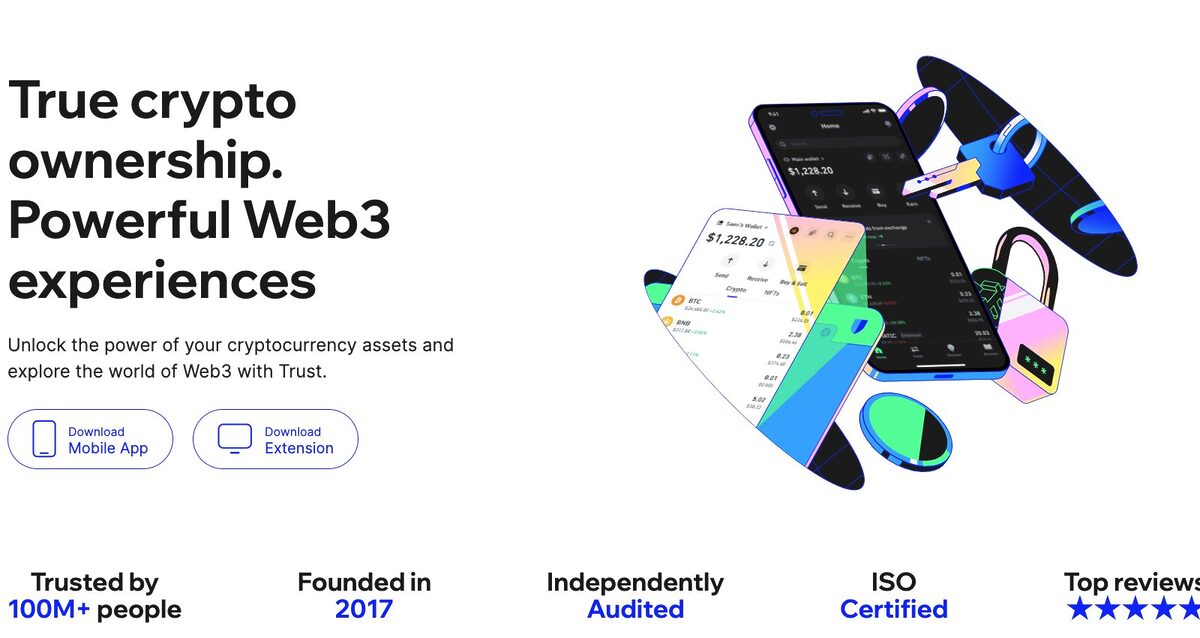
Trust Wallet’s most distinguishable feature is the dApp browser, which allows users to transition between their wallet and decentralized apps at will. This allows them to make full use of Web3 to acquire dApps like Have and Uniswap which grant more flexibility for storing and selling crypto, such as being able to sell ERC-20 tokens, for example.
Alongside supporting over 100 blockchains and plenty of NFTs, users can also stake their crypto on Trust Wallet to earn special rewards.
In terms of security, Trust Wallets require a pin or passcode to access funds, along with a 12-word private key passphrase, which can be extended for extra security. The absence of dedicated desktop access is a bit of a letdown, but Trust Wallet will still prove handy for those interested in utilizing Web3 and dApps as part of their investment plans.
Visit Trust Wallet
Pros:
- Includes an innovative dApp browser.
- Allows users to stake crypto for unique rewards.
- 12 private key passcode can be extended for extra security.
Cons:
- Only available on mobile.
- Limited customer support.
7. Electrum – A Safe and Secure Bitcoin Wallet Through-and-Through
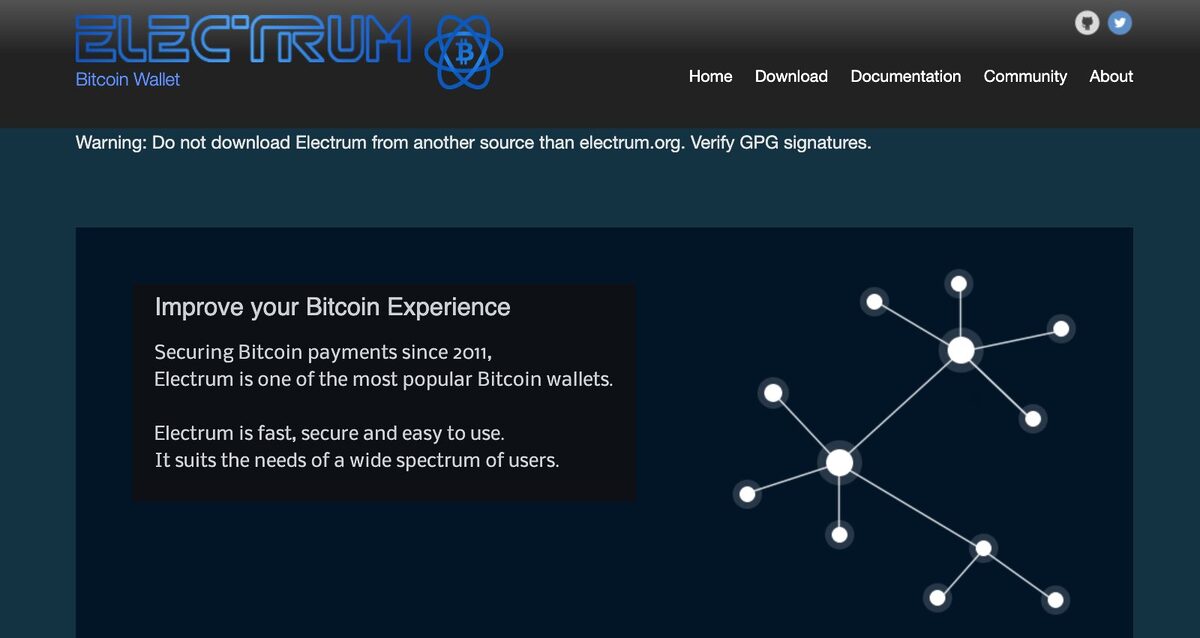
Though Electrum is a Bitcoin-exclusive wallet, it also features some of the tightest security features on the market. Electrum ensures that your private keys are fully encrypted and stored on a personal computer while using Multisig tech to verify each transaction.
Despite launching in 2011, Electrum still allows third-party plugins, which can always be a big help for beginners. Its age also means that the interface is a little clunky and not always the easiest to navigate though.
This wallet is also completely open-source, which lends it a lot of credibility. It is free to download for Windows, Mac, Linux, and Android mobile devices. It might not be the best choice for versatile long-term investors, but Bitcoin users shouldn’t pass this up.
Visit Electrum
Pros:
- Allows for third-party plugins.
- Ensures private keys are encrypted and safe.
- Can run on Windows, Mac and Linux.
- Multisig functionality to prevent misuse of assets.
- Completely free.
Cons:
- Only supports Bitcoin.
- Old and fairly clunky interface.
Non-Custodial Wallets: Most Important Aspects to Look For
At this point, non-custodial wallets have been the talk of the crypto world for quite a while, and it’s because they offer so many unique advantages, including not relying on a cryptocurrency exchange.
When acquiring a new self-custody wallet, it’s important to look for all of the features listed below, as they are what make these digital wallets so special.
- Security Measures: Users have full control over their keys and funds through seed phrases and pins, making the wallet personal and secure. Some will also include extra security tools, such as being open-sourced or containing innovative systems like MPC.
- Currency Flexibility: The types of currencies a non-custodial wallet supports can differ greatly, so choose one that handles your crypto. Some wallets sneakily omit popular cryptos like ETH, BNB, or BTC, so always read the fine print to know what you’ll get.
- Offline Functionality: A hot wallet can make transactions quickly and easily online, while cold wallets keep the keys stored away offline. Cold wallets provide extra security but are also limited in functionality due to being offline, so choose carefully.
- Accessibility: Pay attention to where the wallet can be downloaded and how this will affect your crypto habits. Software wallets may only be available on specific browsers, like Firefox or Google Chrome, while other non-custodial wallets are mobile applications on specific systems, like iOS or Android. The absence of KYC regulations also means most non-custodial wallets are quick and easy to set up, which is always a welcome bonus.
On the Flipside
- Non-custodial wallets come with plenty of benefits, but this doesn’t mean you should skip out on custodial wallets entirely. These third-party reliant tools are usually much more accessible and easier to use, so don’t be afraid to consider picking one of them up instead if it suits you better.
Why This Matters
Not everyone is a fan of keeping their hard-earned tokens in the hands of custodial wallet providers, with non-custodial often being viewed as a safer and more secure alternative. Though they all serve the same purpose, their deeper tools and functionalities make them ideal for different types of investors. Therefore, doing some research before going all-in is never a bad idea.

